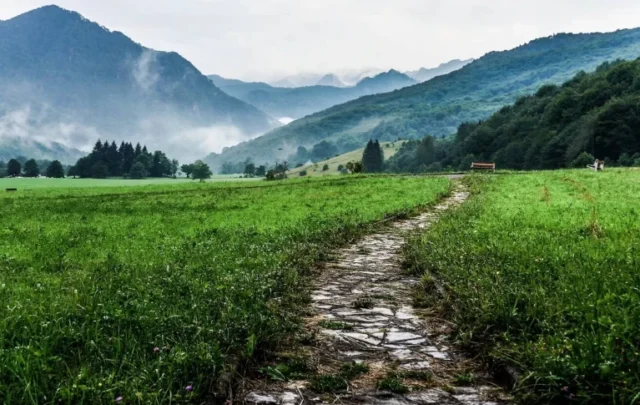Click on the headline (link) for the full text.
Many more articles are available through the Energy Bulletin homepage
Continuity of family for sustainable culture
Jan Lundberg, Culture Change Letter #123
The growing interest in sustainable living is partly attributable to preparing for petrocollapse and a subsequent lower-energy society. Even without the certainty of global oil extraction peaking now (or very soon), quite a few back-to-the-land hippies have for decades emphasized “Earth skills,” communal living, and other forms of living lightly on our ecologically stressed planet.
More than ever, thanks to the “peak oil craze,” all sorts of people who are concerned about resource depletion and climate change are establishing or strengthening networks and developing useful skills. The most oft-discussed topic may be the design of food-gardens and farms that use a minimum of outside inputs. …
Where’s Grandma?
One little-discussed topic for the sustainability movement is the continuity of families. Protecting generations and family lines comes down to security of one’s family home. If family members lose contact either by distance, enmity or death, it is like one’s leg being cut off. When people lose their home, especially if they have depended on the surrounding land, this “collateral damage” or economic oppression (or other form of theft) can guarantee the breakdown or dissolution of family simply due to members being no longer able to stay together.
(4 March 2006)
Green technology to make sewage a less dirty word
$110 million wetlands-based wastewater facility under construction
Glen Martin, SF Chronicle
Petaluma’s new wetlands sewage plant is expected to provi… Petaluma water officials Margaret Orr (left) and Michael … From Waste to Wetlands. Chronicle Graphic Levee Breach Floods Farmland. Chronicle Graphic
Petaluma residents soon will help local wildlife simply by flushing their toilets.
That may seem odd, given that sewage is more often viewed as an ecological bane than a boon. But officials say a new $110 million facility that will use wetlands to treat the city’s sewage and storm runoff will benefit critters as well as people.
The idea, which has been tried in small towns but never in a city the size of Petaluma, promises to change sewage from a municipal liability to a valuable natural resource that can help restore wildlife habitat.
(7 March 2006)
The end of growth: efforts in Japanese society and business to slow down
Japan for Sustainability Newsletter #038
In Japan, the concept of a “lifestyle of health and sustainability” (LOHAS) has been gaining popularity, along with a “slow life” movement that has been booming for several years. These movements are evident in books, magazine feature articles, websites, and newspapers ads. Some big bookstores have a section dedicated to slow life and slow food. You can even hear “slow music” on Japanese airlines. What kind of potential do these movements have in Japanese society?
The desire for slower lifestyles might work as a leverage point to depart from our present growth-oriented society. Not only individuals but also companies are now making efforts for this kind of social change. Perhaps the country is entering into an exciting era.
…It seems, however, that the structure or mindset of the Japanese society has been changing slowly but steadily. As presented in Japan for Sustainability Newsletter #14 (October 2003), various movements are developing throughout the country, with such names as the “Take-It-Easy Declaration” in Iwate Prefecture, “Jimoto-gaku” (community studies) in Minamata City, Kumamoto Prefecture, and the “Slow Life Declaration” in Kakegawa City, Shizuoka Prefecture.
www.japanfs.org/en/newsletter/200310.html
Here is an interesting example. During the planning stage for the construction of a new condominium, the prospective residents had a heated debate on whether or not an elevator should be installed. Some were opposed because once installed it would consume energy, which would mean carbon dioxide emissions. Others were in favor, insisting that elderly people living on the top floors would need it.
How did they solve the problem? A “slow elevator” was their solution. They agreed to install an elevator that moves slowly. Young people don’t want to wait for the elevator, while elderly people can use it if they want to, since they are usually not in a rush. As expected, once installed, the slow elevator is now used only by the elderly, and it consumes much less energy than a conventional elevator.
October 31, 2005
Web site builds powerful storehouse of research
Dan Goodin, Associated Press via Seattle Times
SAN JOSE, Calif. — It’s a lofty ambition — the Internet equivalent of the Public Broadcasting Service, a user-supported resource that pays top academics to create authoritative maps, articles and links to third-party content related to virtually any scholarly topic.
But the vast scope of the project hasn’t stopped former high-flying Silicon Valley entrepreneur Joe Firmage from building Digital Universe, a commercial-free storehouse of information more than three years in the making.
A pilot version that debuted in January includes 50 or so portals, or entry points, on topics such as technology, the Earth and the solar system. Firmage says it will mushroom to at least 500 portals by next year and 10,000 by 2011.
(6 March 2006)
The Digital Universe is at http://www.digitaluniverse.net/. An Energy Portal is listed but I wasn’t able to access it. -BA
Bio-diesel an alternative way of life in Berkeley
Dorothy Vriend, Contra Costa Times
People from across Bay Area go to BioFuel Oasis co-op to end dependence on oil, make political statements
————-
Berkeley resident Jane De Martini likes to ride her bicycle as much as possible, but with a teaching job in Pittsburg this year she found herself putting hundreds of miles every week on her car.
When an accident at the Bay Bridge toll plaza totaled her Saab, she was ready for something that fit better with her environmental principles — a Volkswagen Jetta with an engine that she can fill with bio-diesel fuel.
“It was a good opportunity to end my dependency on fossil fuels,” De Martini said.
She enjoys fueling up at BioFuel Oasis on Fourth Street at Dwight Way, even if it takes a few minutes longer than a stop at a typical gas station. While she can’t just slip her credit card into the pump and press a button, there’s the added benefit of getting a chance to talk with like-minded people who come from around the Bay Area to fuel up.
At BioFuel Oasis, patrons have to pull into the garage one at a time to use the single bio-diesel pump. A sign-up sheet at the door encourages clients to get out of their cars and chat. Inside, a comfortable old couch, some literature and a few organic snacks are also designed to enhance the wait.
(6 March 2006)





